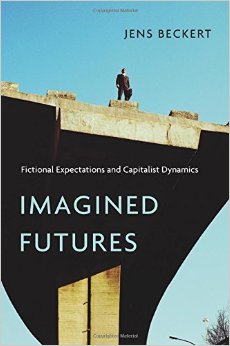In Imagined Futures: Fictional Expectations and Capitalist Dynamics, Jens Beckert explores how individual and collective expectations shape the functioning of capitalist systems, challenging mainstream economic models based around efficient markets, rational expectations and general equilibrium. This is a welcome account rich with examples that contributes to understanding the structuring role played by shared fictions, writes Mehmet Kerem Coban.
Imagined Futures: Fictional Expectations and Capitalist Dynamics. Jens Beckert. Harvard University Press. 2016.
 It is common sense to claim that human beings are social animals. The social dimension of being an ‘animal’ is crucial for knowledge production due to exchanges among individuals. Such knowledge creation was deemed the ‘social construction of reality’ by John Berger and Thomas Luckmann in the 1960s. Following in the steps of these authors while touching upon similar accounts of the notion of the ‘social animal’ offered by John Maynard Keynes and Benedict Anderson, Jens Beckert shows how imaginaries are important for the functioning of a capitalist system, challenging (mainstream) economic theories such as efficient markets, rational expectations and general equilibrium. In addition, the author reviews where expectations have emerged in sociology, which was not much emphasised until his previous studies in 2013a and 2013b, upon which this book builds.
It is common sense to claim that human beings are social animals. The social dimension of being an ‘animal’ is crucial for knowledge production due to exchanges among individuals. Such knowledge creation was deemed the ‘social construction of reality’ by John Berger and Thomas Luckmann in the 1960s. Following in the steps of these authors while touching upon similar accounts of the notion of the ‘social animal’ offered by John Maynard Keynes and Benedict Anderson, Jens Beckert shows how imaginaries are important for the functioning of a capitalist system, challenging (mainstream) economic theories such as efficient markets, rational expectations and general equilibrium. In addition, the author reviews where expectations have emerged in sociology, which was not much emphasised until his previous studies in 2013a and 2013b, upon which this book builds.
To summarise, Beckert argues that a capitalist system relies upon expectations whose source can be traced to the fictions that individuals create and those that are shared with others. These expectations constitute the core and source of advancement in the capitalist system and aim to speak about possibilities in the future, determining how we behave today (interested readers might also refer to a recent collection of articles on ‘motivated reasoning’ in the Journal of Economic Perspectives).
Imagined Futures is divided into three sections. In the first, Beckert makes a point about the temporality of capitalism, followed by the introduction of the main argument of the book on expectations and how they are influential in overcoming uncertainty. Finally, Beckert presents ‘fictional expectations’, which provide the basis for dynamism in capitalism. The second section establishes the link between the building blocks of capitalism that Beckert considers as being the most crucial for the functioning of a capitalist economy: money and credit; investment; innovation; and consumption. In the final section, Beckert revisits forecasting and economic theory. These two have a lot to do with expectations, uncertainty and fiction as they might be regarded as the instruments individuals use to convince themselves and others or to achieve certain ideological and political goals. In brief, Beckert highlights how reality and knowledge are created in a social way through learning from others, in particular through the use of expectations and fictions concerning future possibilities.
 Image Credit: Arrows (Stig Nygaard CC BY 2.0)
Image Credit: Arrows (Stig Nygaard CC BY 2.0)
To better understand the core argument of the book, let us discuss the relationship between expectations and the four building blocks. According to Beckert, there are four main ‘building blocks’ of capitalism: money and credit; investment; innovation; and consumption. All of these depend on expectations. For example, an investor imagines a rate of profit or money, especially fiat money, acquires its credibility by the promise of the issuer to regulate the price of money and/or pay you back something in return. In the case of credit, it is the borrower’s promise to honour the debt. Although we may assume that all parties have so-called ‘perfect information’, this is not possible for most of us. To give an example, Beckert quotes Max Weber on investment. For Weber, investment is very much dependent on sufficient knowledge of demand, supply, cost, the latest legal regulations and technology (133). Having information about all the necessary data in those areas, let alone producing knowledge about how time would change today’s dynamics, is not accessible to everyone. Consequently, when one does not have sufficient knowledge, we rely on that of others, informed by their previous experiences, biases and life perceptions. In the end, knowledge is therefore produced socially through exchanges with others in which fiction and expectations play an instrumental role.
The book is rich in examples through which readers can grasp the role of expectations in the functioning of capitalism, varying from investment in pharmaceuticals to credit markets and the politics of categorising countries and firms by rating agencies. To give one, let us recall the global financial crisis experience almost eight years ago. The expectations of rising asset prices led to a shared understanding among consumers and investors that there was no end to the credit saga. When the mood in the markets changed dramatically, individuals had begun selling the ‘story’ they had invested in. This collective belief – which we may call a collective (naïve) intentionality à la John Searle – led to naivety for borrowers and lenders because everyone assured each other that there was no end to the trend that financiers had to ‘dance to until the music stopped’.
While I would praise the richness of examples and the book’s contribution to knowledge through its systematic analysis of fiction and expectations in daily life, Imagined Futures is not isolated from (constructive) criticism. First of all, since the book focuses on the ‘microfoundations’ of the capitalist system, the relationship between, say, credit as one of the building blocks of capitalism and the expectations related to default risk and/or profit accruing from the interest rate may sound very different from gift or exchanges in a sharing economy. The expectation of cooperation or receiving something in return by giving away a gift today may not be dissimilar to relationships in a capitalist society. The reader may therefore wonder if expectations and fictions are unique to the capitalist system, or if they have been with us since before the modern economic system emerged.
Second, and probably more importantly, Beckert mentions that ‘rational actor theory and sociological theories that focus on how action is guided through calculation, norms, institutions, or structures of social networks are of little help’ (75). He then has a sub-section on the social foundations of fictional expectations (86-92), of which networks, institutions and cognitive devices are just a few. He also mentions that ‘the credibility of expectations is unthinkable without the structures provided by institutions, conventions, and social power’ (273). Finally, Beckert proposes that the link between institutions and fictional expectations deserves exploration.
These observations may lead the reader to question if fictional expectations could be produced without a reference to existing institutions. From my own experience, I was contacted by a member of marketing staff of a foreign exchange (Forex) firm in Turkey. The guy on the phone was always telling me about their models and assistance to clients, and the motivation is to earn money. When I challenged him with ethical questions, such as his company producing nothing at all by merely trading money for money, he always replied with statements about earning money. When the structure in the financial markets institutionalises profit as the sole objective, it becomes very difficult to imagine something totally different from that institution, especially when you are making your living from it. Consequently, imagining fictional expectations in relation to institutions may in fact be the central or starting point for analysis.
Imagined Futures achieves its objective of making a case for the significance of fictional expectations and their necessary (presumably insufficient) role in the capitalist system in a manner not previously done before. The book is therefore a great contribution to our knowledge about the sociological sources of psychological processes in knowledge creation.
Mehmet Kerem Coban is a PhD Candidate at the Lee Kuan Yew School of Public Policy, National University of Singapore. His PhD thesis focuses on the political economy of banking regulation in Turkey (financial consumer protection, macroprudential regulatory governance and the adoption of Basel III). He obtained his Master’s Degree in Development Studies at the Graduate Institute of International and Development Studies, Geneva. His main research interests are international political economy, the political economy of development, regulation, financial liberalization and financial regulation. Email: m.keremcoban[at]u.nus.edu. Read more by Mehmet Kerem Coban.
Note: This review gives the views of the author, and not the position of the LSE Review of Books blog, or of the London School of Economics.








9 Comments